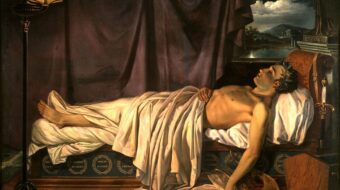
We cannot allow the name of George Orwell to be known only in connection with the fictional works Animal Farm and 1984, or with Homage to Catalonia.
His proletarian novel Keep the Aspidistra Flying, written in 1934-35, was published in April 1936 by Victor Gollancz Ltd. in London. By that time Orwell had already published two other novels, Burmese Days and A Clergyman’s Daughter. He also had published in The Adelphi, a left-wing journal edited by a wealthy magnanimous baronet, Orwell being one of his protégés. There is such a character, Philip Ravelston, modeled on him in Aspidistra, and other clearly autobiographical references abound in the novel as well.
Not familiar with aspidistra? I wasn’t either. The aspidistra is a hardy, long-lived houseplant popular in the heavily curtained oil- and gas-lit Victorian era and still common in middle-class homes in Orwell’s time. Perhaps owing to its name almost made up to be satirized, it was already a joke by the 1930s: The comedienne Gracie Fields recorded a music-hall song called “Biggest Aspidistra in the World.” Because of its virtual indestructibility, it is also known as the barroom plant, the iron plant, or the cast-iron plant. With a nod to its ubiquity in undistinguished English homes, Orwell uses the plant to symbolize and spoof the mediocrity of pedestrian patriotism and team-spiritedness, adapting the expression “Keep the flag (or the colors) flying” to signify “Up with the middle class!”
Gordon Comstock comes from a decent but impoverished family. He’s received a competent education and knows the literary canon as well as all the contemporary writers—for most of whom he snarls sophomoric disdain. Fully realizing he is himself but a minor literary talent, with one barely noticed little book of poems to his name, he gives up a promising career as an advertising copywriter to manifest his contempt for the money cult and all its perversions. The lowly bookseller jobs he takes to subsist give Orwell the eye-opening opportunity to explore the reading habits of the general public.
His pretentious, pseudo-proletarian badge of honor becomes a badge of horror as he descends into anger, bitterness, and distinctly anti-social behavior. Eschewing every luxury as a snob in reverse, he nevertheless harbors envy toward those who enjoy them. Professing “no room for ambition, no effort, no hope,” he desultorily pokes at his poetry, a life deteriorating from one day to the next, even as friends, a sister, and his girlfriend Rosemary earnestly try to redeem him.
“Before, he had fought against the money code, and yet he had clung to his wretched remnant of decency. But now it was precisely from decency that he wanted to escape. He wanted to go down, deep down, into some world where decency no longer mattered; to cut the strings of his self-respect, to submerge himself—to sink, as Rosemary had said. It was all bound up in his mind with the thought of being under ground. He liked to think of the lost people, the under-ground people: tramps, beggars, criminals, prostitutes…. He liked to think that beneath the world of money there is that great sluttish underworld where failure and success have no meaning; a sort of kingdom of ghosts where all are equal…. It comforted him somehow to think of the smoke-dim slums of South London sprawling on and on, a huge graceless wilderness where you could lose yourself forever.”
In lifting up a kind of nobility in the egalitarianism of depravity, Comstock represents the very opposite of what, despite all its faults and flaws, the Soviets were attempting during that very decade in the USSR, the world’s first socialist state.
At one point Comstock and Rosemary are on the verge of having sex for the first time, but she recoils because he won’t use contraception. “Money again, you see!” he rants at her. “You say you ‘can’t’ have a baby. … You mean you daren’t; because you’d lose your job and I’ve got no money and all of us would starve.”
In a scene like this, and there are quite a few, Comstock shows himself to be both a bully and a cad, lording his vows of poverty over other people who have not accepted his terms. Although he does acquit himself later on by marrying Rosemary who is bearing his child, it’s not so much an honorable act as a big step toward his embourgeoisement, a fatalistic re-entry into the halls of “respectability.”
In fact, Comstock never was a true proletarian, for he always had an ace in the hole: In Aspidistra’s inconclusive ending, when he rejoins the advertising firm he earlier so despised, is Comstock any the wiser? Does he see any new truth in the world that will sustain him in the years ahead? Or is this finally just a terrifying coming of age story, a would-be writer’s long night of the soul until he emerges into Everyman’s daylight?
The simple revulsion against money is insufficient as protest. One can’t be a monk in the world, or sink to the bottom of society just as a personal statement. If fascism is to be resisted, much less capitalism—the novel appeared on the eve of the outbreak of the Spanish Civil War, when Hitler had already been in power for three years—a deeper, less individualistic analysis is needed. Comstock’s heroic embrace of penury looks like just another dead-end form of escapism.
Comstock’s mistake—and at this stage of Orwell’s progress, perhaps it was his as well—was to identify “money” as the great devil, the bogeyman, the enemy, rather than “capital,” that is, the class relationships under capitalism that make the accumulation of money, and the lack of it, so problematic. We see this mistake replicating over and over again—populist rabble-rousers sounding off against Big Money, the Big Banks, Wall Street and “the Swamp,” and sometimes hinting at sinister international Cabals of Capital, and ordinary working people sucking it up like mother’s milk, unaware that in that dreaded, feared word “socialism” they may find some lasting answers.
Perhaps it is for this reason that, writing to the anarchist thinker George Woodcock in 1946, Orwell remarked that Aspidistra was one of the two or three books of which he was ashamed. Incidentally, a 1997 film adaptation of the novel was known in the U.S. as A Merry War.
Aspidistra continues the investigations Orwell already explored in his nonfiction work Down and Out in Paris and London, published in 1933, three years earlier, and prefigures The Road to Wigan Pier the year after Aspidistra. The great Homage to Catalonia, his account of the conflict in Spain, the fascist war which he intimated was coming in Aspidistra, dates from only two years later, 1938. In this, thanks to the experience of the Spanish radicals, he shows the fate of the common man as a collective project, not the individual’s search for perfection. One could say that with Homage Orwell achieved his maturity as a political writer, although it was his two post-war books, Animal Farm and 1984, that brought him real everlasting renown.
There are a few missing pieces in the novel. One of Comstock’s poems has been accepted by a San Francisco magazine, and he is paid rather handsomely for it—which triggers his final and most degrading act of self-abnegation. The magazine further asked to see more of his work, which he never follows through on. His self-important blowhard identity of being a writer held back only by money issues shatters against the actual reality that he had the talent but simply lacked the discipline and perseverance for a writer’s life. In that sense, the novelist sets Comstock up as his own anti-hero, for no one could accuse Orwell for being unproductive—inconsistent, perhaps yes, but nevertheless a hard worker to the end.
If Comstock literally throws his literary career down the drain—an outcome that did not need to happen—Orwell may have been trying to make him stand in for all the aspirations and gifts people have or might have just starting out in life that never get a chance to develop in the money-chasing economy. Instead, we are surrounded by that damnably common aspidistra—not just the botanical plant but the whole conformist, mediocre life of average folk that it represents, which flourishes under every possible condition, an invasive species like the pervasive advertising slogans that pollute our language.
In the end Comstock does achieve his longed-for descent, but not into the gutter. Rather, into the cogwheels of the capitalist marketplace, never to be heard from again—unless perhaps, a decade or two later, when he mounts a hotel dais at the annual Advertising Council convention to receive an award for his prize-winning campaign for the unguent that promises to relieve the scourge of sagging eyelids.
I don’t know if the following poem, rendered complete in the body of the novel as the artful culmination of an affecting account of a work in progress, has ever been reprinted in any anthology of proletarian poetry, but it is most worthy of recalling. What is missing in the novel is any mention of what becomes of this poem that preoccupied the waking thoughts of the protagonist for so long. Was it ever submitted for publication? Was it tossed out, as were his copious notes for an epic poem, London Pleasures, that he decided against finishing now that he had his respectable day job again? Perhaps Orwell meant it in a narrative sense to die away unread by the world, but to survive only in a literary sense, awaiting discovery only in the pages of this novel. Here it is:
Sharply the menacing wind sweeps over
The bending poplars, newly bare,
And the dark ribbons of the chimneys
Veer downward; flicked by whips of air,
Torn posters flutter; coldly sound
The boom of trams and the rattle of hooves,
And the clerks who hurry to the station
Look, shuddering, over the eastern rooves,
Thinking, each one, “Here comes the winter!
Please God I keep my job this year!”
And bleakly, as the cold strikes through
Their entrails like an icy spear,
They think of rent, rates, season tickets,
Insurance, coal, the chivvy’s wages,
Boots, school-bills and the next instalment
Upon the two twin beds from Drage’s.
For if in careless summer days
In groves of Ashtaroth we whored,
Repentant now, when winds blow cold,
We kneel before our rightful lord;
The lord of all, the money-god,
Who rules us blood and hand and brain,
Who gives the roof that stops the wind,
And, giving, takes away again;
Who spies with jealous, watchful care,
our thoughts, our dreams, our secret ways,
Who picks our words and cuts our clothes,
And maps the pattern of our days;
Who chills our anger, curbs our hope,
And buys our lives and pays with toys,
Who claims as tribute broken faith,
Accepted insults, muted joys;
Who binds with chains the poet’s wit,
The navvy’s strength, the soldier’s pride,
And lays the sleek, estranging shield
Between the lover and his bride.
Sources: Background biographical data and quotes from Wikipedia.












Comments